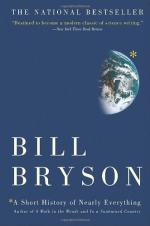
|
| Name: _________________________ | Period: ___________________ |
This quiz consists of 5 multiple choice and 5 short answer questions through Part 5, Chapter 17.
Multiple Choice Questions
1. Today, scientists know that radiation in high doses is:
(a) Tolerable.
(b) Healthy.
(c) Safe.
(d) Toxic.
2. If Earth did not have an atmosphere, it would be what?
(a) Boiling hot.
(b) Dark.
(c) Extremely windy.
(d) Frozen.
3. Which of the following is not a layer of Earth?
(a) Core.
(b) Filling.
(c) Crust.
(d) Mantle.
4. In 1971, Mike Voorhies discovered an amazing fossil bed in Nebraska full of skeletons of prehistoric animals killed 12 millions years ago. How did they die?
(a) Infected by deadly bacteria.
(b) Drowning in a massive flood.
(c) Frozen in a freak snowstorm.
(d) Inhaling ash spewed by a volcano.
5. How deep is Earth's atmosphere?
(a) 120 miles.
(b) 800 miles.
(c) 5 miles.
(d) 30 miles.
Short Answer Questions
1. The troposphere is the layer of atmosphere:
2. During the time of the dinosaurs, Earth's magnetic field was:
3. When French physicist Henri Becquerel accidentally left a packet of uranium salts on a photographic plate, what happened?
4. When radiation was first discovered, it was sometimes added to:
5. The strongest earthquake ever recorded was measured off the coast of Chile in 1960. What did it measure on the Richter scale?
|
This section contains 227 words (approx. 1 page at 300 words per page) |

|




